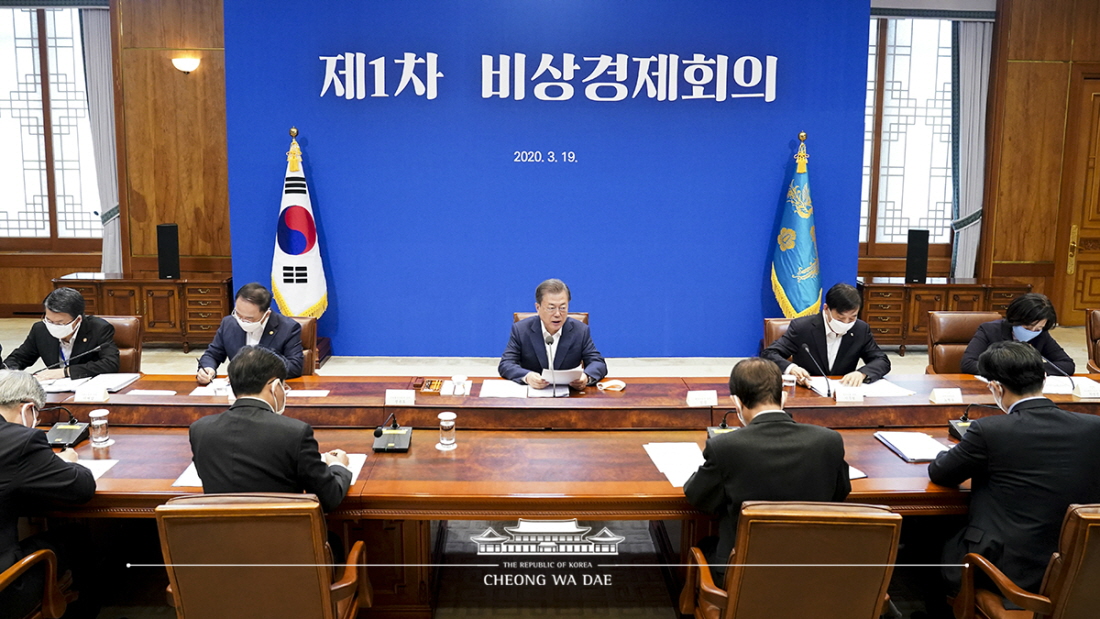이 웹사이트는 제19대 대통령 임기 종료에 따라 대통령기록관이 「대통령기록물 관리에 관한 법률」에 의해 이관받아 서비스하는 대통령기록물입니다. 자료의 열람만 가능하며 수정 · 추가 · 삭제는 불가능합니다.
다만, 「개인정보보호법」에 의하여 개인의 정보를 보호받기 원하시는 분은 관련 내용(요청자, 요청내용, 연락처, 글위치)을 대통령 웹기록물 담당자(044-211-2253)에게 요청해 주시면 신속히 검토하여 조치해 드리겠습니다. 감사합니다.
SPEECHES & REMARKS
BRIEFINGS
Opening Remarks by President Moon Jae-in at 1st Emergency Economic Council Meeting

The Government has unquestionably transitioned to emergency mode. The Emergency Economic Council will go into high gear from today. This Council will play the role of a central economic response headquarters like the Central Disease Control Headquarters.
The Government renews its firm determination to cope with this global economic emergency. More than anything else, we must make decisions expeditiously and act boldly. The Emergency Economic Council should become a meeting for decisions and actions, not for discussion and review.
Today, the inaugural Emergency Economic Council will decide on its first steps to address financial concerns and prevent the bankruptcy of SMEs, microbusiness owners and the self-employed; they make up the foundation for the household economy of low-income families. This is a special emergency financial measure in the amount of 50 trillion won. As a package program to stabilize people’s livelihoods and finances, it is an unprecedentedly comprehensive approach both in scale and content.
All entities in the financial sector together with the Government and the Bank of Korea have joined forces to provide sufficient liquidity to SMEs, microbusiness owners and the self-employed and mobilized all available means. If necessary – depending on how the situation unfolds – we will continue to increase the scale of support as well.
In particular, the Bank of Korea has played a great role in determining this special measure. Not only financial and fiscal authorities but also the central bank and state-owned financial institutions as well as commercial banks and even non-bank financial institutions have come together as one for cooperation and participation. This is the first time that this has happened. I am grateful to the Bank of Korea for its proactive efforts to lead the financial sector across the board while responding dutifully to a national economic emergency in its capacity as the central bank – in addition to its surprise benchmark interest rate cut.
The focus of today’s inaugural meeting is on resolving the financial difficulties facing those SMEs, microbusiness owners and self-employed hit hardest by the COVID-19 outbreak. First of all, new emergency management funds for microbusiness owners have expanded to about 12 trillion won. The lending institutions involved will include commercial banks, allowing the eligible to take out loans at very low interest rates of about 1.5 percent at any relevant institution.
In addition, special guarantee support totaling 5.5 trillion won will be provided to SMEs and microbusiness owners. This support is expected to help the self-employed and microbusiness owners who are most in trouble.
Additionally, several crucial and urgent measures will be implemented in a prompt manner. First, the extension of loan principal due dates will be expanded to include all financial institutions. For the first time ever, the entire non-bank financial sector – savings banks, insurance companies, the National Credit Union Federation of Korea, the Korean Federation of Community Credit Cooperative and credit card companies – participated in extending loan maturity. This is a measure to alleviate the loan repayment burdens of SMEs and microbusiness owners.
Second, all of the financial institutions in the nation also agreed to postpone SMEs and microbusiness owners’ interest payments on loans, a move to lessen their financial burdens as sales have fallen sharply due to the COVID-19 outbreak.
Third, a full-guarantee program for less-established microbusiness owners will be implemented for the first time. Through funds totaling 3 trillion won, a full guarantee will be provided to those with annual sales of less than 100 million won for loans up to 50 million won, allowing them to get a loan at low interest rates promptly and conveniently.
I would like to make a special request once more. No matter how good the measures are, they will be effective only if they operate properly on the ground. Those who cannot afford to wait even one day should not see the types of financial assistance laid out today as “pie in the sky.”
After all, how fast support can be provided matters. I ask you to properly carry out supervision – diminish the anticipated bottleneck that will form as loan guarantee evaluations pile up and drastically streamline loan appraisal standards and procedures – so that these loans can be of help in time.
To ensure vigorous financial support, we must encourage and back up the relevant efforts of state-run financial institutions and private sector financial companies by exempting them from responsibility for their proactive measures – a practice applied to public servants showing initiative in the course of their administrative duties. The Financial Services Commission has made it clear that active offers of financial support to those eligible will be exempt from liability. I ask you to attentively supervise and scrutinize to ensure that swift and urgent monetary assistance can be actively provided on the frontlines.
The steps announced today constitute the financial support most urgently requested by microbusiness owners and others. However, these are only part of the necessary measures. To weather this economic crisis, we need many more countermeasures.
We also have to weigh support measures for those who lost their source of income or jobs due to the COVID-19 outbreak. As there is a limit to the Government’s financial resources, cooperation with local governments will also be needed. Since this situation is not business as usual, we need to break away from standard approaches. Preventing the collapse of people’s lives is the top priority. I urge you to make preparations so that effective support measures for the vulnerable can be discussed at the earliest possible date.



